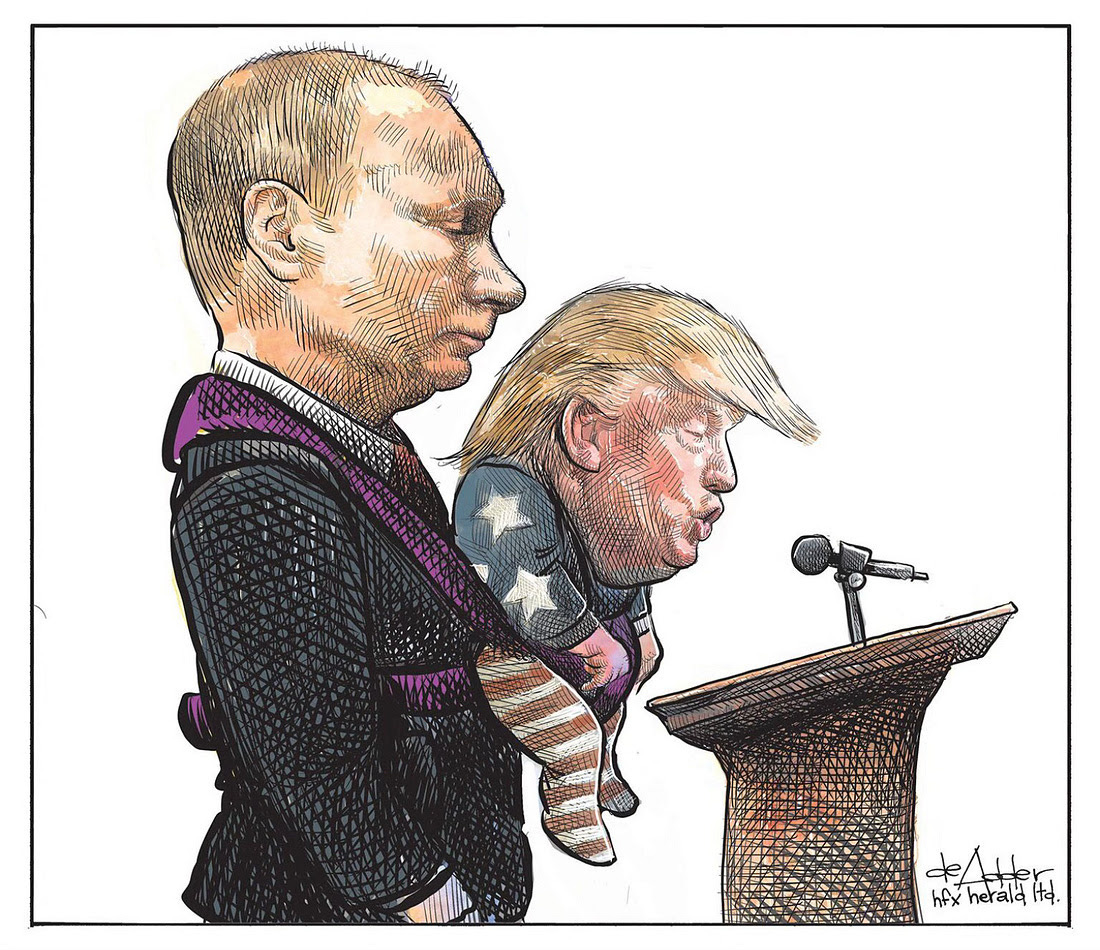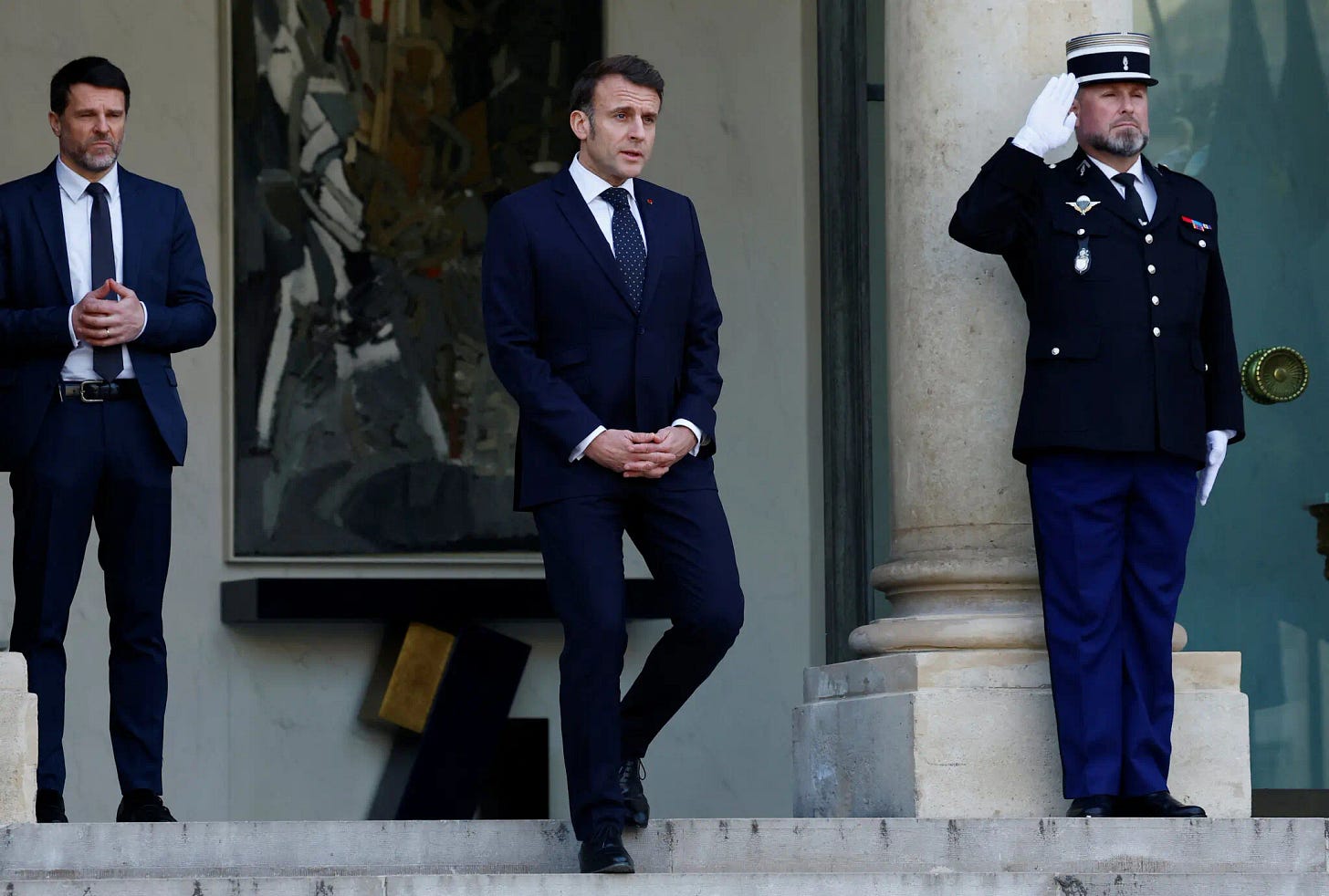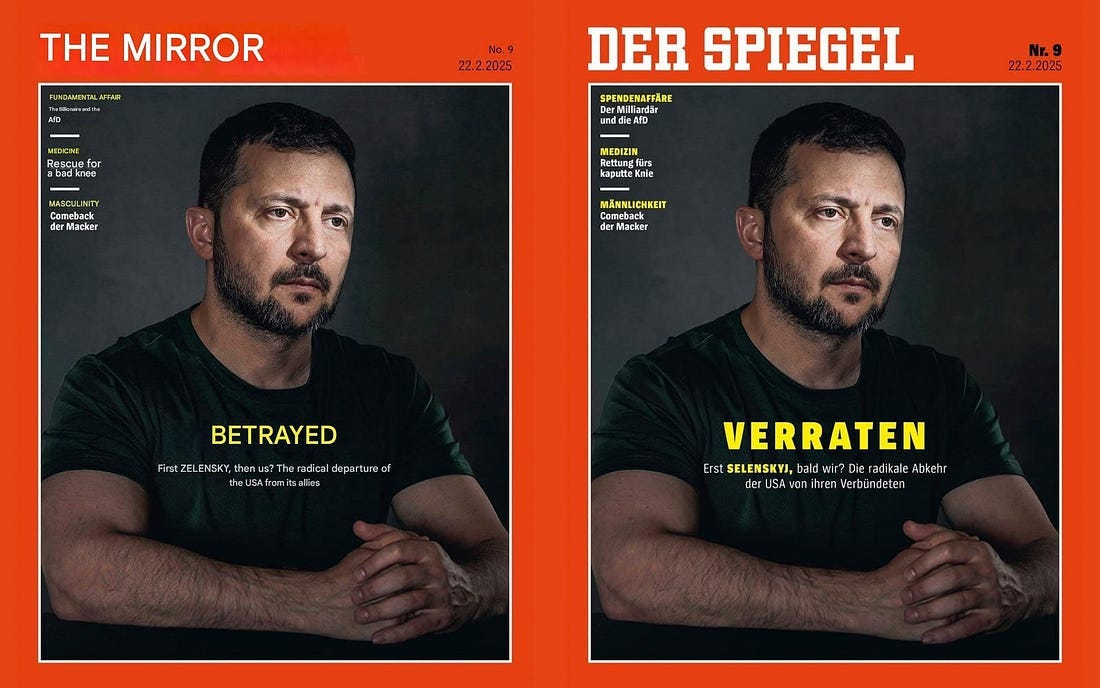EU have a Problem: What the U.S. Strategic Pivot on Russia Means for Europe
📡 Today, people share their thoughts on how the world of 2025 bears a striking resemblance to the world pre-WWI. They claimed that back then, the world’s wealth was concentrated in elite pockets, and rival empires hung onto uneasy truces that were flimsily held together by increasingly irrelevant institutions.
I’ll be mulling this over as European leaders (plus Canada) held a second emergency summit this week (Wednesday) as the continent grapples with a rapidly shifting security outlook. Why?
The Weird Bromance between Trump and Putin
🇷🇺 The catalyst is not so much any change in Russia’s ongoing invasion of a European country (Ukraine)—in fact, any Russian momentum has slowed this month. Rather, it’s a change in the way the US approaches the world, driven by a change in US president:
From a historical standpoint, Trump is signaling a rollback of a defensive alliance that has shaped global security for 75 years—whether because the U.S. can’t (China now demands the focus) or won’t (shifting priorities and value clashes) continue making European defense a top concern.
In the immediate sense, Trump is now labeling Ukraine’s Zelensky a strongman and placing blame on him for Putin’s decision to roll tanks across the border, launch missile strikes on Ukrainian cities, and rattle the West with nuclear threats.
And whether this is just campaign rhetoric or a preview of what’s ahead, the abrupt shift in U.S. positioning has sent shockwaves through the geopolitical landscape.
Even before launching "negotiations" with Russia in Saudi Arabia to broker an end to the war, Trump—who prides himself on being a master dealmaker—handed Putin two major concessions upfront:
The indefinite control of Russian-occupied Ukrainian land (roughly 20% of the country)
And the shelving of Kyiv’s NATO aspirations.
In Trump’s view, Russia could keep what it seized through force, and NATO expansion was a non-starter. He even suggested that Putin’s battlefield losses had earned him that reward—yes, you heard that right.
Trump is rapidly being described as a “Manchurian Candidate”—Watch the movie if you haven't; it’s really good. Neither the Russian invasion nor its imperialistic rhetoric, nor its countless war crimes, have been condemned, let alone brought up.
So where does it leave Europe?

🇪🇺 From an economic standpoint, Europe remains a formidable, if strained, powerhouse—boasting a GDP ten times that of Russia, whose economy lags behind those of Italy, Canada, and even Texas.
That disparity has been reflected in Europe's backing of Ukraine, with total aid reaching $138B since Russia's invasion, compared to $119B from the U.S. A similar pattern emerges in security assistance: Europe has provided $65B, while U.S. contributions stand at $67B—much of which has been spent domestically.
Yet, given what’s at stake for Europe (which lacks the buffer of a "big, beautiful ocean"), some argue its largest economies should be stepping up further. While Germany—Europe’s economic engine—is the biggest European contributor to Ukraine, its support still amounts to just 0.5% of GDP. The numbers drop even lower across Paris, Rome, and Madrid. It’s only in Northern Europe, the Baltics, and Poland—closer to Russia’s doorstep—where support exceeds 1% of GDP.
The nature of that support has also sparked debate, particularly regarding Germany. Berlin has focused on supplying defensive weaponry, drawing criticism from Ukraine and fellow EU nations for withholding Taurus missiles with a 500-km range. Considering the Ukrainian border sits just 430 km from Moscow, Germany’s reluctance appears driven by fears of escalating tensions with Russia.
🇫🇷 🇬🇧 From a military deployment standpoint, the situation only grows more complex. The UK and France have floated the idea of sending peacekeeping troops to Ukraine as a deterrent against further Russian aggression. But credible assessments suggest that truly dissuading another Russian offensive would require at least 100,000 troops—an enormous commitment. And even before logistics come into play, Moscow has already dismissed the proposal as "unacceptable," while no other nations have stepped forward to support it.
Why the hesitation? For one, stationing troops in Ukraine could stretch Europe’s defenses elsewhere, particularly as the U.S. signals a potential pullback of its own commitments. That creates a strategic dilemma: forces stationed within NATO’s borders are protected by the alliance’s collective defense guarantee, while those deployed in Ukraine would not be. It’s a gap that any sharp-eyed adversary could seek to exploit, testing the resilience of the Western alliance.
NATO’s Article 5 is the alliance’s collective defense clause, stating that an attack on one member is an attack on all. However, it would not apply if countries like the UK or France unilaterally sent peacekeeping troops to Ukraine as NATO operates by consensus, and such a deployment would not be considered a NATO mission.
But both these economic and military dilemmas stem from a deeper issue: the political will to sustain support for Ukraine. For countries bordering Russia—or those with a past under Moscow’s control (arguably all of Eastern Europe)—this war is seen as existential. Putin’s justifications for invading Ukraine—historical claims, Russian-speaking populations, security concerns—could just as easily be turned against them.
Others, like Hungary’s Viktor Orbán—who has repeatedly obstructed EU aid—warn that “the war in Ukraine could easily become an Afghanistan for the EU.” Even among nations with fewer ties to Moscow, Russia is often viewed as a more remote threat, especially when domestic political and economic crises demand immediate attention.
So what’s next?
⚖️ Europe’s second emergency summit didn’t produce any immediate solutions (shocker I know..), but it did help push a key development forward: Mike Waltz, Trump’s national security advisor, just confirmed that France’s Macron and the UK’s Starmer have been invited to the White House for talks next week.
Meanwhile, a notable but largely overlooked moment took place during last week’s Munich conference. In her speech, European Commission President Ursula von der Leyen announced plans to propose an emergency measure that would allow EU nations to exempt military spending from budget deficit limits.
In practical terms, this move would give countries like Spain, Italy, and France more room to expand their defense budgets without running afoul of EU fiscal rules—constraints that have so far limited their ability to ramp up military investment.
Slow progress so far, but progress nonetheless…
What to make of all this?
🇨🇳 At the heart of this US foreign policy recalibration is the recognition that the U.S. must now deter two nuclear peers—China and Russia—simultaneously for the first time in history. Washington’s policymakers may have assessed that by pulling Russia out of China’s orbit, or at least ensuring Beijing and Moscow do not act in lockstep, they can prevent the emergence of a more formidable and cohesive adversarial bloc. The Trump administration, therefore, does not necessarily see Russia as a friend but rather as a rival that must be managed and neutralized.
Ultimately, the U.S. wants its allies to take on more responsibility in their own defense. The vision is one in which NATO is transformed to ensure that European allies bear the burden of conventional deterrence against Russia, while the U.S. focuses primarily on nuclear deterrence and select high-priority capabilities (Read China). (Source Thotharis)
This has been a constant refrain in Trump’s demands for European NATO allies to boost their defense spending beyond 2% of GDP—at the very least!
🔎 In the long run, history may judge that faster and stronger support from Europe—and Biden—could have enabled Ukraine to repel Russia’s invasion entirely, rather than allowing Putin to hold on just long enough for a new U.S. president to negotiate from a position of weakness.
But zoom out further, and another consequence of the shifting dynamic between the U.S. and Europe emerges: a heightened risk of nuclear proliferation.
For decades, U.S. security guarantees have kept allied nations from pursuing their own nuclear arsenals—there was simply no need. But as confidence in those guarantees erodes (whether in perception or reality), countries may begin reassessing their stance. And when the threat feels existential, long-standing taboos can disappear faster than expected.
As Churchill once quipped, “Americans can always be trusted to do the right thing, once all other possibilities have been exhausted.” For Europe, that may be the last hope—or, for the first time in 75 years, they could finally take matters into their own hands…
Also worth noting:
The EU just approved its 16th round of sanctions against Russia.
Ukraine President Volodymyr Zelensky said on Sunday he was willing to give up his position if it meant peace in Ukraine, adding that he could exchange his departure for his country's entry into the NATO military alliance.
The French weekly news magazine Le Point, citing anonymous sources, reported that Trump may attend a parade in the Russian capital to mark the 80th anniversary of victory in the Great Patriotic War. Donald Trump has denied and dismissed the report.








